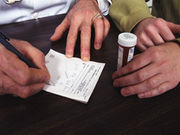For adults, similar efficacy for cognitive behavioral therapy and antidepressants
TUESDAY, Feb. 9, 2016 (HealthDay News) — For adults with major depressive disorder, cognitive behavioral therapy (CBT) and antidepressants have similar efficacy, according to a clinical guideline published online Feb. 9 in the Annals of Internal Medicine.
Amir Qaseem, M.D., and colleagues from the Clinical Guidelines Committee of the American College of Physicians (ACP) conducted a systematic review of the literature to compare and provide clinical recommendations on the comparative effectiveness of treatment with second-generation antidepressants (SGAs) versus nonpharmacologic treatment for major depressive disorder in adults. Data were reviewed from 45 trials.
The researchers found that based on moderate-strength evidence, similar response rates were seen for CBT and antidepressants (relative risk, 0.90; 95 percent confidence interval, 0.76 to 1.07); remission rates were also similar for CBT and antidepressants (relative risk, 0.98; 95 percent confidence interval, 0.73 to 1.32). Antidepressants had higher risks for adverse events than most other treatment options in trials; there was no information available from nonrandomized trials.
“Patients are frequently treated for depression by primary care physicians, who often initially prescribe SGAs,” ACP President Wayne J. Riley, M.D., M.P.H., said in a statement. “However, CBT is a reasonable approach for initial treatment and should be strongly considered as an alternative treatment to SGAs where available, and after discussing treatment effects, adverse effect profiles, costs, accessibility, and preferences with patients.”
Clinical Guideline
Review (subscription or payment may be required)
Editorial (subscription or payment may be required)
Copyright © 2016 HealthDay. All rights reserved.








